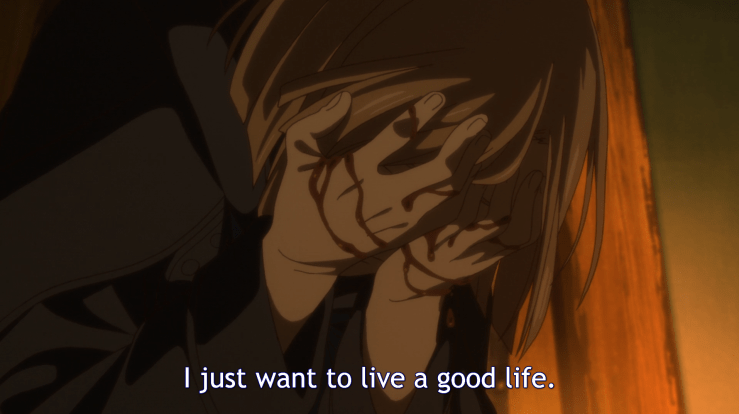During the week leading up to Easter, I often think upon the love Christ showed us through the cross, the one that models how we are supposed to love others, but giving generously, sacrificially, graciously is so hard to do. We see such love from our parents, though imperfectly, and for some, not often enough. We can exhibit it to our friends, but only on occasion—there is a limit to the time, resources, and pieces of ourselves we will give. And all too often in our lives, we love but not wholly; we love on our own terms.
In episode 23 of The Ancient Magus Bride, we find that Joseph, that pained and tortuous villain, once showed loved to a suffering soul known as Cartaphilus. He brings him into his home, cares for his wounds, and tries endlessly to cure him. Driven mad by endless bullying and a failure to cure, though, Joseph reveals a deep-seated reason for helping Cartaphilus: it is an attempt to give his own life value, to give himself hope and peace.

What happens after Joseph goes mad is of course the thing of horror films and Mary Shelley—intertwined with Cartaphilus, Joseph becomes more selfish than an be imagined, treating other living creatures only as a means to cure or better himself, slaughtering and torturing others to give himself a fleeting measure of relief.
I don’t blame Joseph, at least not for his motivation to help his friend. I’m no different in that my heart reveals that I don’t love people for their benefit only. Some part of me is always looking for an advantage, always looking for how I can be healed, which is absurd because I can’t cure myself and anyway, I’ve already been healed.
In the parable of the prodigal son, both brothers have misplaced their love as well. The focus of the those describing the story is often placed upon the younger brother, who asks for his inheritance from his father early and squanders it on prostitutes and parties, before crawling home, destitute and hungry, to receive forgiveness from his dad. The elder brother has also loved wrongly, though: he has loved his father according to a morality that says he deserves all the inheritance that will one day come his way. The elder brother’s love for his dad isn’t love at all—its a transaction. I give you the best of me, and that’s worth giving back the best of you, which is your riches.
For the elder brother, for Joseph, for myself, we’re all seeking something through the love we give. Selflessness, the very defining characteristic of love, disappears as we try to earn what we deserve by giving what we feel is valuable. It’s no wonder that what we need most, grace, escapes us as we attempt to get what we want through our false love: it was never part of the equation at all.
As episode 23 ends, Chise, now in some way a part of Joseph, chases after him, unrelenting. We must wait until the next episode to see what happens, but the nature of Chise’s pursuit suggests this: for once in Joseph’s life, grace is entering the equation. And once that most powerful magic is used, it lays waste the most formidable foes, even the one what says love is given the way we decide and love can only be earned, a most selfish lie indeed.
—
The Ancient Magus Bride can be streamed on Crunchyroll.
- AniMarch Madness 2026: Let the Madness Begin! - 02.18.2026
- Finding Silver in the Dark: Frieren and The True I AM - 02.16.2026
- Fanart Friday: Kawaiicaptor Valentine - 02.13.2026


[…] Por TWWK […]
[…] Por TWWK […]
[…] past articles on this website have discussed in detail the importance of grace for those in the position of giving […]